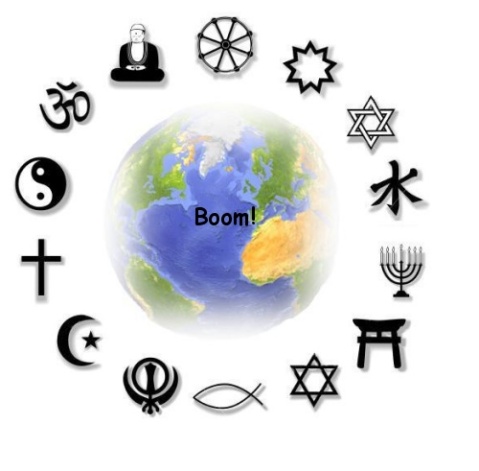Minced Religion
December 30, 2012
 I was raised a Roman Catholic but left the church when I could not sincerely defend its beliefs. Blame it on reading, blame it on college, blame it on science, it doesn’t matter, religious faith, whatever it is, eluded me.
I was raised a Roman Catholic but left the church when I could not sincerely defend its beliefs. Blame it on reading, blame it on college, blame it on science, it doesn’t matter, religious faith, whatever it is, eluded me.
And it eluded me from a young age. The questions I asked about mysterious things were never adequately answered by nuns, priest or parents. Even now I don’t understand how anyone could come to believe what is fundamentally unbelievable to them— to embrace the substance of ” things hoped for, the evidence of things not seen,” as the Bible says.
Can’t get there from here, I say; by God’s grace, say others, resorting to futility. In any case holiness and spirituality, and our path to and through them, have little to do with religion. Religion is something else.
Part of my difficulty with religious faith is that faiths are as prolific and varied as the stuff in the cereal aisle of the local super-market, from old fashioned Kellogg’s Corn Flakes to faddish upstarts like Ralston’s Batman cereal.
Even monotheists have managed to split their god to smithereens. From the mono a mono three major amigos: Jews, Christians and Muslims, to their virtually infinite sub-variations.
Jews have segmented themselves into Orthodox, Reform, Conservative, Hasidic, and Kabbalahists. Christian denominations meanwhile, are as numbered as the stars in the sky. The Eastern Roman Catholic Church alone, according to Wikipedia, has as many as twenty versions, each with its own theological tweak: the Armenian Catholic Church, the Belarusian, the Coptic, Byzantine of Croatia, Ethiopian, Georgian, Maronite, Slovak Greek, etc., etc., etc.
And wait, there’s more. The Eastern Orthodox Catholics are not to be outdone by Eastern Roman Catholics. Wiki lists over thirty variants; and, remember, we haven’t even gotten to Protestants.
Protestants have, from the days of Martin Luther to the present, protested Roman Catholic domination to the point of fractious fracture. Main-stream Protestant denominations may be grouped into nine families: Anabaptist, Anglican, Baptist, Congregational, Lutheran, Methodist, Pentecostal, Quaker, and Reformed, which are further divided into no less than one hundred sixty-one (give or take a sect) of an infinity of possibilities.
Finally, Islam too clearly wants variety. Muslims have worked out, among others, the following breakdowns: Abādites, Al-Ahbash, Al-Arquam, Böszörmény, Faizrakhmanist, Gedimu, and Haruriyyah —and that only covers the first eight letters of the alphabet.
If these figures are boggling remember we’ve only been talking about monotheists. When we throw in Buddhists, Hindus, Folk religions, Shinto, Sikism, Bahá’í,Cheondoism, Wicca, and so on we must be giving God data-base gridlock.
In fact, following the logic of numbers, we might conclude that this religious mincing will end in a quantity of religious divisions exactly equal to the population of the globe at any given moment.
With the difficulty of systemizing the ineffable, this possibility makes perfect sense. Who but we, individually, may know what resides in our hearts regarding the mystery of creation and how best to embrace it?
Frightening, isn’t it? With the amount of AK-47s floating around, and the historical record of religious war, you have to wonder where such creedal splintering in the land of the free and the world at large will end, if ever.
I only mention this because, politically speaking, in a country such as the USA, whose population has professed a belief in God reaching seventy-six percent, religion is becoming as dangerously problematic as it has been for centuries among other peoples. Not only is our polarization political, but it’s tainted with the variegated mythical beliefs of citizens who get their orders directly from God (think Michelle Bachmann).
Case in point: The Sovereigns.
The Sovereigns are yet one more twist on the millennial-long efforts of humans to come to terms with what they do not know (and probably will never know —in this life at least). The Sovereigns have come together to say “screw you” to anyone rational enough to know that if sectarianism has not brought humans together under God by now, it more than likely will not into the foreseeable future.
Sovereign Pastor Paul Revere (a nutcase formerly known Douglas Fleshman) declares he “… doesn’t recognize the authority of the State of Oregon, the United States of America, or anyone else that presumes to have some command over him. He answers only to God.”
The members of Pastor Revere’s congregation “… are becoming an increasing headache for cops, public defenders, prosecutors, bailiffs, and judges all over the U.S., because when they inevitably land in court for driving without a license or failing to pay taxes (they) clog up the system with reams of nonsensical paperwork.”
But that’s just the un-bloody part of the The Sovereigns problem. As we might expect with zealots, “Sometimes the battles get bloody … In 2010, 16-year-old sovereign Joseph Kane gunned down two police officers in West Memphis, Ark., after a routine traffic stop. The boy killed the officers with an AK-47 after his dad, 45-year-old sovereign Jerry Kane, got into a scuffle with one of the cops attempting to frisk him.”
Variety, they say, is the spice of life. I like it. I like diversity. What I don’t like is inviting religion into government and allowing its manifest variations to squabble between themselves and the rest of us to the point of religious war and state theocracy.
We have a constitution that does not once mention the word “god”. Not once. It does not for good reason —emphasis on reason.
Saying I get my orders directly from God is just another way of saying I get my orders from myself. Who’s to argue?
.
by Jim Culleny
12/30/12